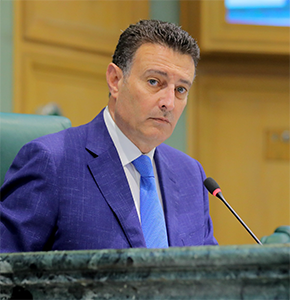You are here
Lower House passes 2023 cybercrime bill
By JT - Jul 27,2023 - Last updated at Jul 27,2023

Lower House Speaker Ahmad Safadi during a House session on Thursday (Petra photo)
AMMAN — Lawmakers on Thursday endorsed the 2023 Cybercrime bill during a session headed by Lower House Speaker Ahmad Safadi and attended by Prime Minister Bisher Khasawneh and members of the Cabinet.
After referral from the Lower House Legal Committee, the bill was passed following extended deliberations that resulted in amendments to certain articles, the Jordan News Agency, Petra, reported.
The legislative justifications cited for the bill include the rapid developments in the ICT field which require the criminalisation of illegal acts committed via electronic means, and aligning the bill with the Arab Convention on Combating Information Technology Offences and international anti-cybercrime standards.
The bill will provide protection for public and private rights and freedoms in circumstances related to online extortion, e-fraud, incitement of violence and hatred, insults to religion, violations of privacy, and digital attacks on e-payment methods and banking services.
The draft law also recognises certain judicial and police procedures related to cybercrime, and organises the country’s relationship with social media platforms operating outside of Jordan.
Article 3 of the draft law stipulates: "Any person who accesses or deliberately accesses an information network, information system, information technology means or any part thereof by any means without a permit, or contravening or exceeding a permit, shall be liable to a term of imprisonment of no less than one week and no more than three months, or a fine of no less than JD300 and no more than JD600, or both."
Item B of Article 3 states: "If the entry or access provided for in the Item A of this article represents an attempt to cancel, delete, add, destroy, disclose, publish, reproduce, block, modify, transmit, copy, or breach the confidentiality of data, information or encryption, stop or disable the operation of the information network, information system, information technology or any part thereof, the perpetrator shall be liable to a term of imprisonment of no less than three months and no more than one year, and a fine of no more than JD600 and no more than JD3,000. The penalty shall be a term of imprisonment of no less than one year and no more than three years and a fine of no less than JD3,000 and no more than JD15,000 if perpetrator(s) succeeded in their endeavour(s)."
Item C of Article 3 stipulates: "Any person who deliberately enters or accesses a website for the purpose of altering, cancelling, damaging, modifying, occupying, encrypting, stopping, disabling, or impersonating the website or its owner shall be liable to a term of imprisonment of no less than three months and a fine ranging between JD600 and JD3,000.”
The House also approved Article 5 of the draft law, which states: "Anyone who creates an account, page, group, channel or the like on social media platforms and falsely attributes it to a natural or moral person shall be liable to a term of up to three months' imprisonment or a fine ranging between JD1,500 and JD15,000, or both. Pursuant to this article, anyone who manufactures, creates or designs a programme, application, website, e-mail or the like and falsely attributes it to a natural or moral person shall be liable to a term of imprisonment of no less than six months and a fine of no less than JD9,000 and no more than JD15,000.”
The council also approved Article 13, which imposes a fine on anyone who transmits or promotes pornography or sexual content.
Article 14 of the bill penalises any person who uses an information network, information technology or information system or establishes a website to facilitate, promote, incite, or assist in the incitement of prostitution, debauchery, seducing another person, or offences to public morality is subject to imprisonment for a minimum of six months and a fine ranging between JD9,000 and JD15,000.
This article also stipulates that anyone who uses an information network, information technology or information system or establishes a website for the purposes set out in Item A of Article 14 for the exploitation of persons under 18 years old or persons with psychiatric illnesses or mental disabilities shall be sentenced to prison with temporary labour and a fine ranging between JD15,000 and JD45,000.
During the session, Lower House Speaker Ahmad Safadi stated that "reports in the media claiming that the House did not criminalise homosexuality and sexual perversion on the Internet are incorrect".
"The House, by criminalising pornography, offences to public morality and the promotion of sexual deviancy in articles 13, 14 and 15 of the draft cybercrime law, addressed those crimes in general,” Safadi said.
Article 13 of the draft cybercrime law imposes a fine on any individual who broadcasts or promotes pornographic or sexual acts. Article 14 states that those who "use the Internet, information technology or information systems, or create a website to facilitate, promote, solicit, aid and abet prostitution, fornication, seducing others or violating public morality shall be subject to imprisonment for a minimum of six months and a fine of no less than JD9000 and no more than JD15,000”.
Related Articles
AMMAN — The Senate on Tuesday referred the cybercrime bill back to the Lower House after drafting revisions of the bill. The amendments
AMMAN — The Lower House on Wednesday approved the amended cybercrime bill as referred from the Senate.The Senate on Tuesday made some amendm
AMMAN — Activists have launched a campaign on social media calling for withdrawing the draft cybercrime law from the Lower House, describing


















